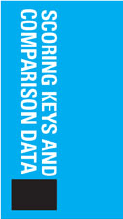Whetten David A., Cameron Kim S. Developing management skills
Подождите немного. Документ загружается.


MANAGING CONFLICT CHAPTER 7 437
_________ Broke down complex issues, separated the critical from the peripheral;
began with a relatively easy problem
_________ Helped disputants avoid entrenched positions by exploring underlying
interests
_________ Remained neutral (facilitator, not judge) and impartial toward issues
and disputants
_________ Kept the interaction issue oriented (e.g., pointed out the effect of the
conflict on performance)
_________ Made sure that neither party dominated conversation, asked questions
to maintain balance
_________ Kept conflict in perspective by emphasizing areas of agreement
_________ Helped generate multiple alternatives, drawn from common goals, values,
or principles
_________ Made sure that both parties were satisfied and committed to the proposed
resolution
Comments:

Group Skills
8 EMPOWERING AND DELEGATING
Empowering others
Delegating
Sharing power
9 BUILDING EFFECTIVE TEAMS AND TEAMWORK
Diagnosing team development
Building teamwork
Fostering effective team leadership
10 LEADING POSITIVE CHANGE
Creating positive deviance
Leading positive change
Mobilizing the capabilities of others
CHAPTERS
Part III

439
Empowering
and
Delegating
SKILL
DEVELOPMENT
OBJECTIVES
■ EMPOWER OTHERS
■ EMPOWER YOURSELF
■ DELEGATE EFFECTIVELY
SKILL
ASSESSMENT
■ Effective Empowerment and Delegation
■ Personal Empowerment Assessment
SKILL
LEARNING
■ Empowering and Delegating
■ A Management Dilemma Involving Empowerment
■ The Meaning of Empowerment
■ Historical Roots of Empowerment
■ Dimensions of Empowerment
■ How to Develop Empowerment
■ Inhibitors to Empowerment
■ Delegating Work
■ International Caveats
■ Summary
■ Behavioral Guidelines
SKILL
ANALYSIS
■ Minding the Store
■ Changing the Portfolio
SKILL
PRACTICE
■ Executive Development Associates
■ Empowering Ourselves
■ Deciding to Delegate
SKILL
APPLICATION
■ Suggested Assignments
■ Application Plan and Evaluation
SCORING KEYS
AND
COMPARISON DATA

440 CHAPTER 8 EMPOWERING AND DELEGATING
SKILL
ASSESSMENT
DIAGNOSTIC SURVEYS FOR EMPOWERING
AND DELEGATING
EFFECTIVE EMPOWERMENT AND DELEGATION
Step 1: Before you read the material in this chapter, please respond to the following
statements by writing a number from the rating scale below in the left-hand column (Pre-
Assessment). Your answers should reflect your attitudes and behaviors as they are now,
not as you would like them to be. Be honest. This instrument is designed to help you dis-
cover your level of competency in empowering and delegating so you can tailor your
learning to your specific needs. When you have completed the survey, use the scoring key
at the end of the chapter to identify the skill areas discussed in this chapter that are most
important for you to master.
Step 2: After you have completed the reading and the exercises in this chapter and, ideally,
as many as you can of the Skill Application assignments at the end of this chapter, cover up
your first set of answers. Then respond to the same statements again, this time in the right-
hand column (Post-Assessment). When you have completed the survey, use the scoring key
at the end of the chapter to measure your progress. If your score remains low in specific skill
areas, use the behavioral guidelines at the end of the Skill Learning section to guide further
practice.
Rating Scale
1 Strongly disagree
2 Disagree
3 Slightly disagree
4 Slightly agree
5 Agree
6 Strongly agree
Assessment
Pre- Post-
In situations in which I have an opportunity to engage others in accomplishing work:
______ ______ 1. I help people develop personal mastery in their work by involving them first in less
complex tasks, and then in more difficult tasks.
______ ______ 2. I help people feel competent in their work by recognizing and celebrating their small
successes.
______ ______ 3. I serve as an example of successful task accomplishment.
______ ______ 4. I identify other successful people who can serve as role models.
______ ______ 5. I frequently praise, encourage, and express approval of other people.
______ ______ 6. I provide regular feedback and needed support to other people.
______ ______ 7. I try to foster friendships and informal interaction.
______ ______ 8. I highlight the important impact that a person’s work will have on others and on goals.
______ ______ 9. I try to provide all the information that people need to accomplish their tasks.

EMPOWERING AND DELEGATING CHAPTER 8 441
______ ______ 10. As I become aware of it, I pass along relevant information to people on a continuous
basis.
______ ______ 11. I ensure that people have the necessary resources (equipment, space, and time) to
succeed.
______ ______ 12. I help people get access to needed resources that I may not have available personally.
______ ______ 13. I help people become involved in teams in order to increase their participation.
______ ______ 14. I encourage teams to make decisions and implement their own recommendations.
______ ______ 15. I foster confidence by being fair and equitable in my decisions.
______ ______ 16. I exhibit caring and personal concern for each person with whom I have dealings.
When delegating work to others:
______ ______ 17. I specify clearly the results I desire.
______ ______ 18. I specify clearly the level of initiative I want others to take (e.g., wait for directions,
do part of the task and then report, do the whole task and then report, etc.).
______ ______ 19. I allow participation by those accepting assignments regarding when and how work
will be done.
______ ______ 20. I make certain that the amount of authority I give matches the amount of responsi-
bility I expect for producing results.
______ ______ 21. I work within existing organizational structures when delegating assignments, and I
never bypass someone without informing him or her.
______ ______ 22. I identify constraints and limitations that people will face but also provide needed support.
______ ______ 23. I maintain accountability for results, not for methods used.
______ ______ 24. I delegate consistently—not just when I’m overloaded.
______ ______ 25. I avoid upward delegation by asking people to recommend solutions, rather than
merely asking for advice or answers, when a problem is encountered.
______ ______ 26. I make clear the consequences of success and failure.
PERSONAL EMPOWERMENT ASSESSMENT
This instrument helps identify the extent to which you are empowered in your own
work. You should respond to the items based on your own job, or, if you are in school, the
work you do as a student. The items listed below describe different orientations people
can have with respect to their work roles. Using the following scale, indicate the extent
to which you believe each is true of you:
Rating Scale
1 Very strongly disagree
2 Strongly disagree
3 Disagree
4 Neutral
5 Agree
6 Strongly agree
7 Very strongly agree
Assessment
______ 1. The work that I do is very important to me.
______ 2. I am confident about my ability to do my work.
______ 3. I have significant autonomy in determining how I do my job.
442 CHAPTER 8 EMPOWERING AND DELEGATING
______ 4. I have significant impact on what happens in my work unit.
______ 5. I trust my coworkers to be completely honest with me.
______ 6. My work activities are personally meaningful to me.
______ 7. My work is within the scope of my competence and capabilities.
______ 8. I can decide how to go about doing my own work.
______ 9. I have a great deal of control over what happens in my work unit.
______ 10. I trust my coworkers to share important information with me.
______ 11. I care about what I do in my work.
______ 12. I am confident in my capabilities to successfully perform my work.
______ 13. I have considerable opportunity for independence and freedom in how I do my work.
______ 14. I have significant influence over what happens in my work unit.
______ 15. I trust my coworkers to keep the promises they make.
______ 16. The work I do has special meaning and importance to me.
______ 17. I have mastered the skills necessary to do my work.
______ 18. I have a chance to use personal initiative in carrying out my work.
______ 19. My opinion counts in my work unit’s decision making.
______ 20. I believe that my coworkers care about my well-being.

EMPOWERING AND DELEGATING CHAPTER 8 443
SKILL
LEARNING
Empowering and Delegating
Many management books are oriented toward helping
managers know how to control others’ behavior. They
focus on how managers can increase employees’ perfor-
mance, engender conformity, or motivate employees to
achieve certain objectives. This book, too, includes skills
that will help you motivate people to do what you want
them to do (see the chapter on Motivating Others) or
achieve power and influence over them (see the Gaining
Power and Influence chapter). The present chapter, how-
ever, focuses on a skill called empowerment and on a
special form of empowerment called delegation.
Empowerment is based on a set of assumptions that
are in contrast to those normally made by managers.
Empowerment means providing freedom for people to
do successfully what they want to do, rather than getting
them to do what you want them to do. Managers who
empower people remove controls, constraints, and
boundaries for them instead of motivating, directing, or
stimulating their behavior. Rather than being a “push”
strategy, in which managers induce employees to
respond in desirable ways through incentives and influ-
ence techniques, empowerment is a “pull” strategy. It
focuses on ways that managers can design a work situa-
tion so that it energizes and provides intrinsic encourage-
ment to employees. In the context of such a strategy,
workers accomplish tasks because they are intrinsically
attracted by them, not because of an extrinsic reward
system or influence technique.
Empowering others, however, can lead to dilem-
mas. On the one hand, evidence shows that empow-
ered employees are more productive, more satisfied,
and more innovative, and that they create higher-quality
products and services than unempowered employees
(Greenberger & Stasser, 1991; Kanter, 1983; Sashkin,
1982, 1984; Spreitzer, 1992). Organizations are more
effective when an empowered workforce exists (Conger
& Kanungo, 1988; Gecas, 1989; Thomas & Velthouse,
1990). On the other hand, empowerment means giving
up control and letting others make decisions, set goals,
accomplish results, and receive rewards. It means that
other people probably will get credit for success.
Managers with high needs for power and control (see
McClelland, 1975) face a challenge when they are
expected to sacrifice their needs for someone else’s gain.
They may ask themselves: “Why should others get
the goodies when I am in charge? Why should I allow
others to exercise power, and even facilitate their
acquiring more power, when I naturally want to receive
rewards and recognition myself?”
The answer is that although empowering others is
neither easy nor natural (we aren’t born knowing how to
do it), it need not require a great amount of self-sacrifice.
You don’t need to sacrifice desired rewards, recognition,
or effectiveness in order to be a skillful empowering
manager. On the contrary, through real empowerment,
managers actually multiply their own effectiveness. They
and their organizations become more effective than they
could have been otherwise. Nevertheless, for most man-
agers, empowerment is a skill that must be developed
and practiced, because despite the high visibility of the
concept of empowerment in popular literature, its actual
practice is all too rare in modern management.
Evidence for this assertion comes from a national
survey by the Louis Harris organization, reported in
Business Week for January 18, 1993. According to this
survey, feelings of powerlessness and alienation among
workers rose sharply through the 1990s and, accord-
ing to more recent Harris polls, have not reversed
themselves in the twenty-first century (Harris Poll,
2002). The percentage of workers answering “yes” to
the questions in Table 8.1 illustrates this trend.
In this chapter, we begin by discussing the core
dimensions of empowerment and, in particular, how to
effectively accomplish empowerment. In the second part
of this section, we discuss a special situation in which
empowerment is essential: the delegation of responsibil-
ity. We conclude with a summary model of empower-
ment and delegation and a list of behavioral guidelines
for successfully empowering and delegating to others.
A Management Dilemma
Involving Empowerment
One of the most well-researched findings in organization
and management science over the last four decades has
shown that when environments are predictable and sta-
ble, organizations can function as routine, controlled,
mechanistic units. Under such conditions, workers can
be expected to follow rules and procedures and to engage
in standardized, formalized behavior. Managers can main-
tain control and issue top-down mandates regarding the
strategy and direction to be pursued by the organization.

However, the modern business environment is often
described using terms such as hyperturbulence, complex-
ity, speed, competition, and revolutionary change.
Under such conditions, prescriptions for organiza-
tional and management effectiveness call for a flexible,
autonomous, entrepreneurial workforce (DeGraff &
Lawrence, 2002; Drucker, 1988; Quinn, 2005), rather
than one that relies on management for direction
and control. Less-centralized decision making, less top-
down direction, and less-autocratic leadership are all
prescribed as prerequisites for high-performing modern
organizations.
When environments are unstable and unpredictable
—when they change a lot or in unpredictable ways—
organizations must be more flexible and organic.
Workers are expected to be adaptable and self-managing.
Managers must involve others in decision making
and facilitate broad participation and accountability
(Eisenhart & Galunic, 1993; Lawrence & Lorsch, 1967).
The workers flexibility must match the flexibility of the
environment (Ashby, 1956).
Our own research has shown, however, that instead
of becoming adaptable, flexible, autonomous, and self-
managing, individuals in rapidly changing, complex envi-
ronments tend to behave in opposite ways than they
should in order to succeed. Both managers and employ-
ees tend to become less flexible, less adaptable, less
autonomous, less self-managing, and more stable, more
rigid, and more defensive when they face turbulence and
change (Cameron, Whetten, & Kim, 1987; Cameron,
Kim, & Whetten, 1987; Cameron, 1998).
In our research on how organizations are managed
when they face decline, turbulence, downsizing, and
change, we have identified 12 negative attributes or
attitudes, which we label the dirty dozen. Table 8.2
summarizes these negative attitudes.
THE DIRTY DOZEN
Among the dirty dozen attributes is a “threat-rigidity”
response (Staw, Sandelands, & Dutton, 1981; Weick,
444
CHAPTER 8 EMPOWERING AND DELEGATING
1993), in which people become conservative when
faced with uncertainty. They hunker down and become
self-protective and increasingly rely on old, first-learned
habits and past behaviors. In reaction to a perceived
threat, they do that which they know how to do best or
that which has worked best in the past. Despite new
circumstances in which old behaviors may not be effec-
tive, there is an escalating commitment to habitual
behavior. People consider fewer options, look for infor-
mation that confirms their previous biases, and become
more narrow-minded in their perspectives.
In addition, less communication occurs among
workers. When individuals in organizations are
divulging information, they become vulnerable by
putting their personal expertise or untested ideas at
risk. This sense of vulnerability magnifies the feeling of
uncertainty brought about by changing conditions.
Under such circumstances, people are less likely to
become contributing team members and to try out
new, innovative ideas. Fear and conflict increase,
while trust, morale, and productivity decrease. A
“mean mood” is typical of most interactions, as loyalty
and commitment to the organization erode. The ten-
dency in such circumstances is for most important
decisions to be made at the top of the organizational
hierarchy because managers at the top feel an increas-
ing need to be in control and to be closer to decisions.
On the other hand, people at lower organizational lev-
els become hesitant to make decisions without getting
approval from a superior.
How can we ever expect a workforce in the mod-
ern, changing environment to develop the prescribed
characteristics for effectiveness—that is, to be adapt-
able, flexible, autonomous, and self-managing? If
people become more rigid and resistant in uncertain
times rather than more independent and flexible, how
can we ever foster effective performance?
The answer to these questions is to use empower-
ment. If managers are skilled at empowering workers,
the inertia that drives organizations toward dysfunc-
tional dirty dozen attitudes is counteracted. Workers
Table 8.1 Powerlessness and Alienation Survey
QUESTION 1972 1985 1992
What I think doesn’t count very much anymore. 50% 62% 62%
Most people with power take advantage of people like myself. 43% 65% 71%
The people in charge don’t really care what happens to me. 46% 65% 71%
I’m left out of things going on around me. 25% 48% 48%

EMPOWERING AND DELEGATING CHAPTER 8 445
become more effective, even in the face of trying
times. Empowerment is a key to unlocking the poten-
tial of a successful workforce in an era of chaotic
change and escalating competitive conditions.
But what is empowerment? What does it mean to
be an empowered worker? What is the set of manage-
ment skills associated with empowerment?
The Meaning of Empowerment
To empower means to enable; it means to help people
develop a sense of self-confidence; it means to help peo-
ple overcome feelings of powerlessness or helplessness;
it means to energize people to take action; it means to
mobilize intrinsic motivation to accomplish a task.
Empowered people not only possess the wherewithal to
accomplish something, but they also think of them-
selves differently than they did before they were
empowered.
Empowerment is different from merely giving
power to someone. Like empowerment, power con-
notes the ability to get things done. But power and
empowerment are not the same things. Table 8.3 con-
trasts the concepts of power and empowerment so as to
highlight their differences. People may have power and
also be empowered. However, although one can give
someone else power, one must accept empowerment
for oneself. You cannot empower me; you can only cre-
ate the circumstances in which I can empower myself.
As explained in the chapter on Gaining Power
and Influence, the acquisition of power is based on
several personal factors and certain position attributes.
In each case, other people need to acknowledge your
power, follow your lead, and acquiesce to your influ-
ence in order for you to have power. The underlying
source of your power is other people. For example,
you may have power because you have more resources
or political support than someone else. Thus, you can
reward others and have reward power. Alternatively,
you may have the ability to penalize or sanction others
as a result of your strength or support so you have
sanctioning power. Your title or position may give you
power over others, thus giving you traditional power.
You may possess more knowledge or information than
others, giving you expertise power. Or, you may be
personally attractive or charismatic, thus having
referent power. French and Raven (1960) identified
these five factors as being the primary bases of power.
Regardless of whether these are the five factors or
whether there are others, each can be conveyed to
Table 8.2 The Dirty Dozen: Outcomes of Stress in Organizations
ATTRIBUTE EXPLANATION
Centralization Decision making is pulled toward the top of the organization. Less power is shared.
Threat-rigidity response Conservative, self-protective behaviors predominate. Old habits are relied upon.
Change is resisted.
Loss of innovativeness Trial and error learning stops. Low tolerance for risk and creativity occurs.
Decreasing morale In-fighting and a mean mood permeate the organization. It isn’t fun.
Politicized environment Special interest groups organize and become vocal. Everything is negotiated.
Loss of trust Leaders lose the confidence of subordinates. Distrust predominates among employees.
Increased conflict Infighting and competition occur. Self-centeredness predominates over the good
of the organization.
Restricted communication Only good news is passed upward. Information is not widely shared and is held
close to the vest.
Lack of teamwork Individualism and disconnectedness inhibit teamwork. Lack of coordination occurs.
Loss of loyalty Commitment to the organization and to the leader erodes. Focus is on
defending oneself.
Scapegoating leaders Leadership anemia occurs as leaders are criticized, priorities become less clear,
and a siege mentality occurs.
Short-term perspective A crisis mentality is adopted. Long-term planning and flexibility are avoided.
SOURCE: Adapted from: Cameron et al., 1987.

another person. Each depends on others acknowledg-
ing it. Each can be delegated to someone else.
In the case of empowerment, however, people
can be empowered even if no one acknowledges their
personal attributes or positions. Victor Frankl, Nelson
Mandela, and Mahatma Gandhi are examples of indi-
viduals who, despite the absence of the attributes of
power, maintained complete empowerment in dismal
circumstances (i.e., in prison and in bigoted environ-
ments). This is because the source of empowerment is
internal. Its source is within the individual, not as a
result of social acceptance, political support, or title.
One accepts empowerment for oneself.
In addition, if I become more powerful, that gener-
ally means you become less powerful. If I have the
power to get someone to do what I want, but that dif-
fers from what you want, my power and your power
come into conflict. That’s why, ultimately, relatively few
people have power. Power gets concentrated among a
few in most organizations. Furthermore, power strug-
gles are almost universal in organizations and even
small groups. Who gets enough power to have his or her
way is a common problem, and it almost always leads
toward conflict. Power games become a clash of wills or
a battle to see who will win and reign supreme. On the
other hand, every person can be empowered without
affecting any other person’s position or stature. It merely
leads to each of us being enabled to accomplish what
we choose. Empowerment, in fact, is more likely to lead
to cooperation and collaboration than to conflict.
Historical Roots of Empowerment
The word empowerment came into vogue in the
1980s and 1990s but has since taken on the image of
a faddish and even outdated concept (Abrahamson,
1996; Block, 1987). In our own consulting and execu-
tive education teaching, many managers will respond
when introducing the concept of empowerment, “We
already tried that.” Or “That’s a 1990s term, isn’t it?”
446
CHAPTER 8 EMPOWERING AND DELEGATING
Because the concept of empowerment was so widely
used in so many different contexts, it tended to
become almost any management practice relating
to employee involvement. Empowerment became
associated with everything from team-building to
entrepreneurship to flexible benefits. The word became
so overused that its precise meaning became obscured.
It may be helpful, therefore, to provide a brief back-
ground of the roots of empowerment because it is by
no means a new concept. This should help us avoid
confusing empowerment with other related manage-
ment behaviors.
Empowerment has roots in the disciplines of
psychology, sociology, and theology dating back for
centuries. In the field of psychology, Adler (1927)
developed the concept of mastery motivation, empha-
sizing the striving that people have for competence in
dealing with their world. Similar concepts introduced
several decades ago include effectance motivation, an
intrinsic motivation to make things happen (White,
1959); psychological reactance, which refers to
seeking freedom from constraints (Brehm, 1966);
competence motivation, a striving to encounter and
master challenges (Harter, 1978); and personal causa-
tion, a drive to experience free agency (DeCharms,
1979). In each of these studies, the root concepts are
similar to the notion of empowerment discussed in this
chapter; that is, the inclination of people to experience
self-control, self-importance, and self-liberation.
In sociology, notions of empowerment have been
fundamental to most rights movements (e.g., Civil
Rights, Women’s Rights, Gay Rights) (see Bookman &
Morgan, 1988; Solomon, 1976), in which people
campaign for freedom and control of their own cir-
cumstances. Moreover, much of the writing attacking
societal problems through social change has centered
fundamentally on the empowerment of groups of
people (Alinsky, 1971; Marx, 1844). That is, people
seek social change in order to increase their access to
an empowered condition.
Table 8.3 The Difference Between Power and Empowerment
POWER EMPOWERMENT
External source Internal source
Ultimately, few people have it Ultimately, everyone can have it
The capacity to have others do what you want The capacity to have others do what they want
To get more implies taking it away from someone else To get more does not affect how much others have
Leads to competition Leads to cooperation
